Search
Search Results
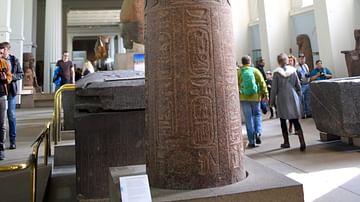
Image
Palm-leaf Column of Ramesses II from Herakleopolis
This column is from a temple primarily dedicated to he dam god Heryshef of Herakleopolis. Ramesses II is twice shown making offerings to a local form of Osiris. The god wears his typical feather crown but is in a kilt not his usual mummy...
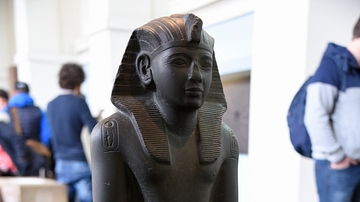
Image
Statue of King Ramesses IV
The statue shows the king offering pots of water or wine. Based on parallel statues, large parts have been restored in modern times, including the hands, posts, and knees. Cartouches enclosing Ramesses' birth and throne names appear on his...
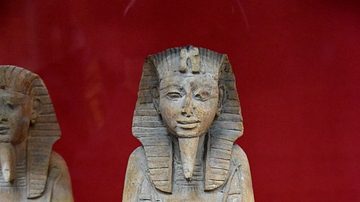
Image
Shabti of Ramesses VI
This is a wooden shabti (ushabti) of the Egyptian pharaoh Ramesses VI. New Kingdom, 20th Dynasty, reign of Ramesses VI, 1143-1136 BCE. From the tomb of Ramesses VI in the Valley of the Kings at Thebes, modern-day Egypt. (The British Museum...
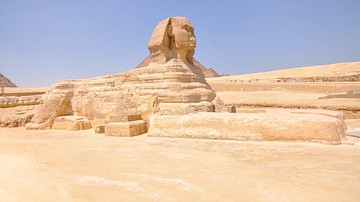
Definition
Ancient Egypt
Egypt is a country in North Africa, on the Mediterranean Sea, and is home to one of the oldest civilizations on earth. The name 'Egypt' comes from the Greek Aegyptos which was the Greek pronunciation of the ancient Egyptian name 'Hwt-Ka-Ptah'...
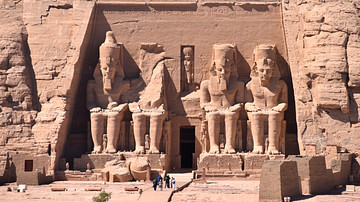
Image
Abu Simbel, Facade of the Temple of Ramesses II
The Great Temple at Abu Simbel was built by Ramesses II and completed around 1264 BCE. It stands 98 feet (30 metres) high and 115 feet (35 metres) long with four seated colossi flanking the entrance, two to each side, depicting Ramesses II...
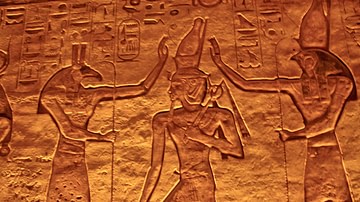
Image
Set and Horus Blessing Ramesses II
Scene from the Temple of Hathor (Abu Simbel, Egypt), built during the reign of Ramesses II, c. 1264-1224 BCE. Set and Horus blessing Ramesses II.
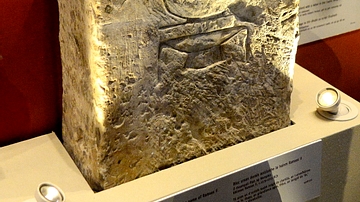
Image
Doorjamb Block of Ramesses II
Limestone doorjamb block bearing the name of the Egyptian pharaoh Ramesses II, from the Temple of Ptah at Memphis, reign of Ramesses II, 1279-1213 BCE.
National Museum of Ireland-Archaeology, Dublin.
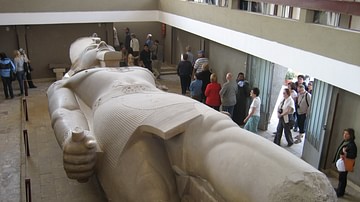
Image
Colossus of Ramesses II
Colossus of Ramesses II in Memphis, Egypt.
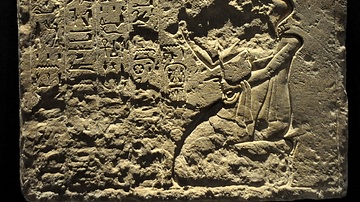
Image
Rahotep & Ramesses II
Limestone stela of Rahotep. It was dedicated to the Egyptian pharaoh Ramesses II. New Kingdom, 19th Dynasty, circa 1250 BCE. (State Museum of Egyptian Art, Munich, Germany).
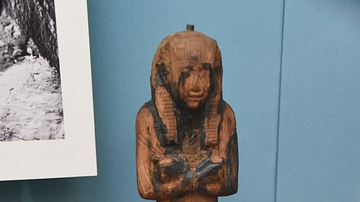
Image
Shabti of Ramesses II
This wooden shabti (ushabti) of the Egyptian pharaoh Ramesses II was remodeled and reused as an Osiris figurine in the 21st Dynasty, 1070-945 BCE. New Kingdom, 19th Dynasty, reign of Ramesses II, 1297-1213 BCE. From Egypt, precise provenance...